Martin Heidegger (1889 – 1976) was a German philosopher who is best known for his work on phenomenology and existentialism. These are two different philosophical movements that share some common ideas, but Heidegger’s work should only be considered part of these movements with care and qualification. His ideas have made a big impact on European philosophy, and he is still influential today. Philosophers have had a deep and widespread impact on many different areas of life, including architecture, theology, and cognitive science.
Martin Heidegger was born on September 26, 1889 in Messkirch, Germany. This was where Heidegger grew up and where he developed his philosophical thoughts. In 1909, he spent two weeks in the Jesuit order before leaving to study theology at the University of Freiburg. In 1911, he switched to a new subject, philosophy. Heidegger’s philosophical development began with reading classical thinkers such as Brentano and Aristotle, as well as their medieval Scholastic interpreters.
Heidegger wanted to know what it is that makes things the way they are. He started to read a lot of philosophers, including Kant, Kierkegaard, and Nietzsche. He was especially influenced by two more recent philosophers: Dilthey and Husserl. In 1915, Husserl took a job at Freiburg University and in 1919, Heidegger became his assistant. Heidegger taught at the University of Marburg for a period of time, but then returned to his home town of Freiburg to take up the chair that Husserl had retired from.
Heidegger’s masterpiece, “Being and Time” was born out of his exploration of influences, critical engagements, and his own experiences. Heidegger thanked his predecessor Husserl for his help and admiration in writing his greatest work.
Heidegger joined the Nazi Party in 1933 and was elected Rector of Freiburg University. After 1934, Heidegger became less involved in Nazi politics. Although he didn’t leave the Nazi party, he did attract some unwelcome attention from its enthusiasts. After the war, the University of Freiburg conducted an investigation into Heidegger and banned him from teaching. He didn’t regain his teaching rights until 1949. One year later, he was given the title of Professor Emeritus.
Even though Heidegger had strong feelings against Nazi Germany, his later writings don’t provide a clear and total rejection of the government. Some people think that Heidegger’s philosophy was influenced by his involvement with the Nazi regime, but that’s a topic for a later time.
After discussing Being and Time, Heidegger had a new idea called “the turn.” This change in his philosophy means that he is moving away from discussing things in terms of how they are, and towards looking at them in a different way. The basic ideas behind “the turn” are found in Heidegger’s second greatest work, Contributions to Philosophy (From Enowning). This is a very strict text that was written in 1936-7, but it wasn’t published until 1989 and wasn’t translated into English until 1999. Heidegger died on May 26, 1976, in Freiburg, Germany, and was buried in Messkirch.


